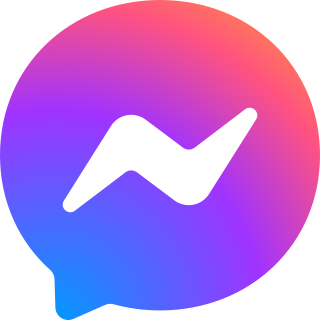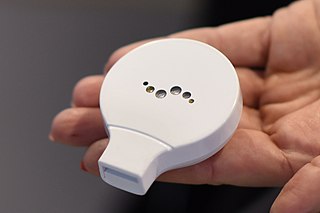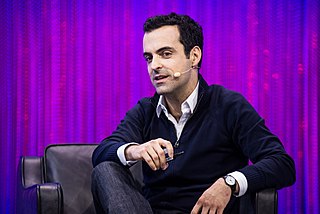
Facebook is an online social media and social networking service owned by American technology giant Meta Platforms. Created in 2004 by Mark Zuckerberg with fellow Harvard College students and roommates Eduardo Saverin, Andrew McCollum, Dustin Moskovitz, and Chris Hughes, its name derives from the face book directories often given to American university students. Membership was initially limited to only Harvard students, gradually expanding to other North American universities and, since 2006, anyone over 13 years old. As of December 2022, Facebook claimed 3 billion monthly active users, and ranked third worldwide among the most visited websites. It was the most downloaded mobile app of the 2010s.
Techmeme is a technology news aggregator. The website has been described as "a one-page, aggregated, filtered, archiveable summary in near real-time of what is new and generating conversation".

The JooJoo was a Linux-based tablet computer. It was produced by Singapore development studio Fusion Garage. Originally, Fusion Garage was working with Michael Arrington to release it as the CrunchPad, but in November 2009 Fusion Garage informed Arrington it would be selling the product alone. Arrington has responded by filing a lawsuit against Fusion Garage.
Snaptu pronounced "snap tu", previously known as Moblica was a free Israeli-made mobile application platform that ran on virtually every type of Internet-enabled mobile phone. It allowed the user to access popular services, varying from social networks like Facebook, Twitter, Flickr, ESPN CricInfo and Picasa to entertainment news, blogs, sports and local guides.

Facebook is a social networking service originally launched as TheFacebook on February 4, 2004, before changing its name to simply Facebook in August 2005. It was founded by Mark Zuckerberg and college roommates and fellow Harvard University students, in particular Eduardo Saverin, Andrew McCollum, Dustin Moskovitz, and Chris Hughes. The website's membership was initially limited by the founders to Harvard students, but was expanded to other colleges in the Boston area, the Ivy League, and gradually most universities in the United States and Canada, corporations, and by September 2006, to everyone with a valid email address along with an age requirement of being 13 or older.

The Nexus S 4G is a smartphone co-developed by Google and Samsung and manufactured by Samsung Electronics for release in 2010. It was the first smartphone to use the Android 2.3 "Gingerbread" operating system, and the first Android device to support Near Field Communication (NFC) in both hardware and software.

Instagram, LLC is a photo and video sharing social networking service owned by American company Meta Platforms. The app allows users to upload media that can be edited with filters, be organized by hashtags, and be associated with a location — via geographical tagging. Posts can be shared publicly or with preapproved followers. Users can browse other users' content by tags and locations, view trending content, like photos, and follow other users to add their content to a personal feed.

Messenger is an American proprietary instant messaging app and platform developed by Meta Platforms. Originally developed as Facebook Chat in 2008, the company revamped its messaging service in 2010, released standalone iOS and Android apps in 2011, and released standalone Facebook Portal hardware for Messenger calling in 2018. In April 2015, Facebook launched a dedicated website interface, Messenger.com, and separated the messaging functionality from the main Facebook app, allowing users to use the web interface or download one of the standalone apps. In April 2020, Facebook released a Messenger desktop app for Windows and macOS.

Niantic, Inc. is an American software development company based in San Francisco. Niantic is best known for developing the augmented reality mobile games Ingress and Pokémon Go. The company was formed as Niantic Labs in 2010 as an internal startup within Google. The company became an independent entity in October 2015 when Google restructured under Alphabet Inc. Niantic has additional offices in Bellevue, Los Angeles, Sunnyvale, Seattle, Lawrence, Tokyo, London, Hamburg, and Zurich.

Burner is a mobile application for iOS and Android made by Ad Hoc Labs, Inc. that allows users to create temporary disposable phone numbers in the U.S. and Canada. The app allows smartphone users to have a phone number that is anonymous and can be thrown away, for purposes such as online ads, while traveling, for business projects, or for dating profiles. Burner is a product of Ad Hoc Labs, an Atwater Village, Los Angeles-based software startup.

Breathometer was a device that claimed to measure someone's blood alcohol content using their iOS and Android smartphones. However, the app proved unreliable, and was shut down by the Federal Trade Commission. Breathometer was founded in September 2013 by Charles Michael Yim, who is the company's current CEO.
Skully was a brand of motorcycle helmet with a heads-up display and a rear-facing camera.
SlickLogin was an Israeli start-up company that developed sound-based password alternatives. The company's goal was to enable end users to log in easily to password-protected websites by using a uniquely generated sound.

Hugo Barra is a Brazilian computer scientist, technology executive and entrepreneur. From 2008 to 2013, he served in a number of product management roles at Google in London and California, including Vice President and product spokesperson of Google's Android division. From 2013 to 2017, he worked at Xiaomi as vice president, Global. From 2017 to 2021, he worked as Vice President of Virtual Reality and Head of the Oculus division at Facebook. In May 2021, he left Facebook to start health technology startup Detect.
The following is a timeline of the history of the photo messaging software Snapchat.
The following is a timeline of WhatsApp, a proprietary cross-platform, encrypted, instant messaging client for smartphones.

Minecraft Earth was an augmented reality and geolocation-based sandbox game developed by Mojang Studios and published by Xbox Game Studios. A spin-off of the video game Minecraft, it was first announced in May 2019, and was available on Android and iOS. The game was free-to-play, and was first released in early access on 17 October 2019. The game received its final update in January 2021 and officially shut down on 30 June 2021 due to the COVID-19 pandemic.

DOWN is a location-based social networking and online dating application for users looking for casual relationships and hookups. Users can swipe up for more serious dating, swipe down for casual hookups, or left to pass, and continue to the next profile. DOWN bills itself as a open-minded, sex-positive alternative to other dating apps.












